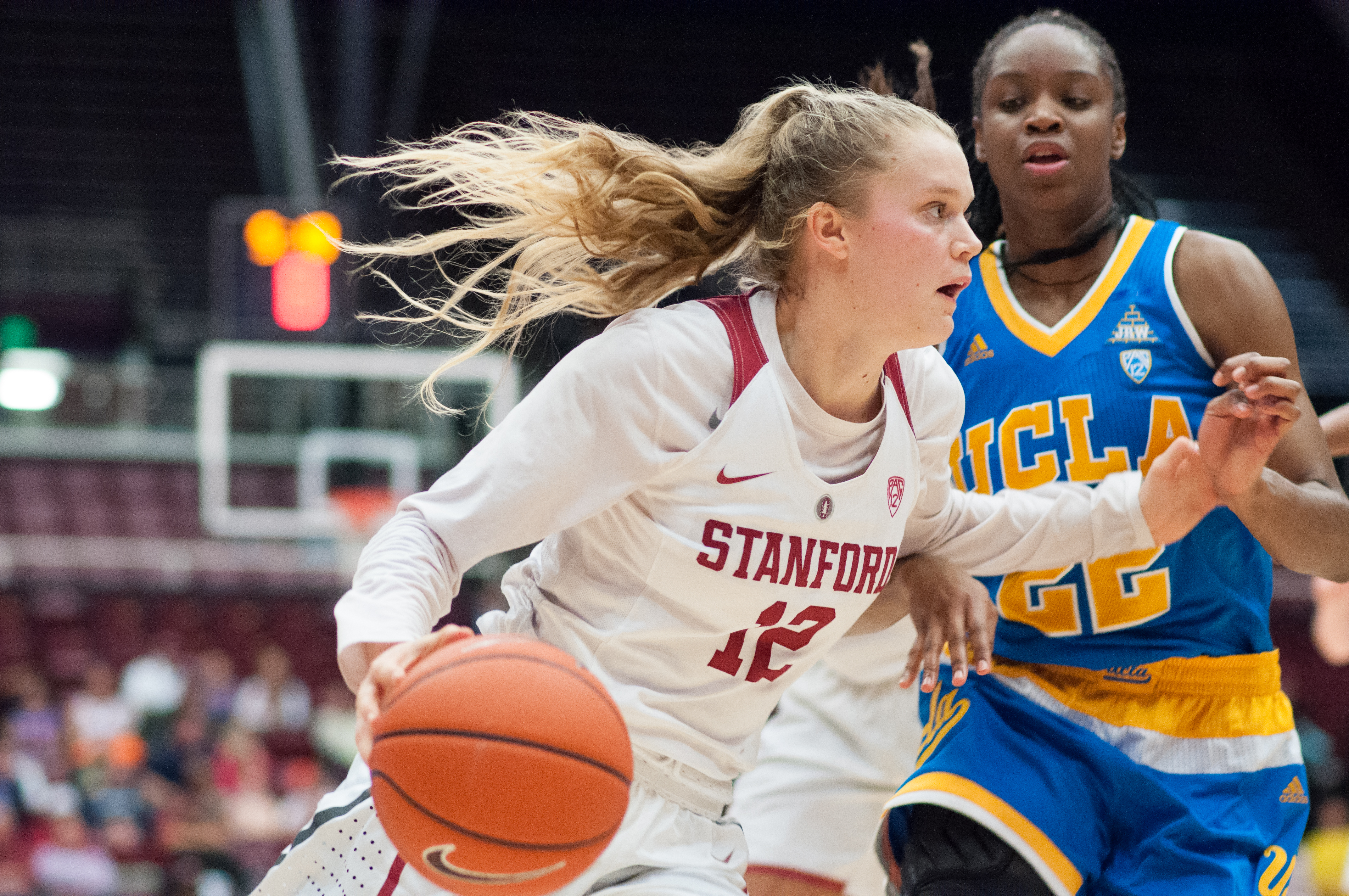Down by 14 heading into halftime against the fast-paced and streaking first-seeded Notre Dame Fighting Irish (33-4), No. 6 Stanford women’s basketball (32-5) entered into what Erica McCall defined earlier in the tournament as “code red”—a “do this by any means necessary” mindset that unifies the team during struggling runs.
Then, after galvanizing its struggling offense and out-of-sorts defense to close the deficit with a pivotal third quarter, Stanford needed frontcourt offensive leaders sophomore Alanna Smith and senior Erica McCall to earn a game-winning bucket and block respectively within the last thirty seconds in order to escape the Lexington region and continue dancing, upsetting the Fighting Irish by a total of 76-75.
“This team really believes,” hall-of-fame Cardinal head coach Tara VanDerveer told ESPN on the court immediately following one of the best coaching performances of her career in Sunday’s win. “They are a great team, and we had to battle.”
In the game-winning fourth quarter that included 13 lead changes, Stanford needed two great possessions—on both ends of the floor—in order to fully complete the upset over No. 2 Notre Dame, ending their 17 game winning streak.
With less than thirty seconds left in the match, sophomore forward Alanna Smith sneakily gained body position over two smaller Fighting Irish defenders in the low post off a bailed-baseline drive from teammate sophomore guard Marta Sniezek, and the Australian forward immediately called for the ball, putting her hands up for her floor general to see.
Sniezek then perfectly lobbed a floating pass that found Smith on the opposite block for an off-balanced but spaced layup, retaking the lead 76-75 with 25 seconds left on the clock.
After Smith blocked a first Fighting Irish attempt at a game-winner from senior guard Lindsay Allen, Notre Dame’s offensive star on the night sophomore Arike Ogunbowale received an inbounds pass with 2 seconds left on the clock, yet the guard couldn’t create enough space for the shot and saw her layup get rejected from Cardinal senior Erica McCall to seal the Stanford win.
“She [Ogunbowale] took a dribble, and I was like, ‘I’m going for it.’” McCall emotionally told reporters during her postgame press conference. “I got a nice, clean block off of it, and we got the win.”
After a neck-and-neck first quarter, the Fighting Irish flexed their shooting capability from all positions by playing a fast-paced, transition offense against a cold-shooting Stanford. The Cardinal barely scored 7 points in the second quarter largely due to foul trouble from offensive creators senior Karlie Samuelson and point guard Sniezek.
The Cardinal turned their fortunes around after hitting their largest deficit (16) just 18 seconds into the third quarter by ending the third on a 24-10 run due to increased ball movement sparked from sophomore Sniezek who assisted on 4 of 8 Cardinal buckets in the pivotal period. As a shallow seven-woman roster struck by injury, the Fighting Irish began to look fatigued by the Cardinal’s ball movement and the fast-pace of the first half and looked out-of-sorts defensively allowing for easier buckets for Stanford.
Stanford’s comeback victory largely came off the back of team leaders junior Brittany McPhee and senior Karlie Samuelson who both drained five from beyond the arc to score 27 and 15 points respectively. The shooters’ 10 combined three-point field goals were part of Stanford’s season-high 12 made from the perimeter during Sunday’s Elite Eight matchup.
In addition to her 27 points on 58.8 percent (10-17) shooting from the field, McPhee grabbed five rebounds and dish four assists as part of a career-defining night to catapult Stanford to its seventh final four appearance in ten years. McPhee performed lights out on both ends of the floor for the Cardinal, adjusting during the second half to hold Ogunbowale to only four points after the sophomore dropped 21 during the first half.
“She worked really hard on her. She told me in the locker room, ‘I want to guard her in the second half.’” head coach Tara VanDerveer recounted to reporters postgame about her halftime locker room talk with McPhee. “Brit had a big game on both ends of the floor, playing great defense and also knocking down her shots.”
When asked by KZSU radio about her second-half defensive adjustments, McPhee stayed focused on her fundamentals, “I’m just not used to guarding someone who can take it in transition like that, and in the beginning, she [Ogunbowale] got a lot of easy buckets coming down because I was late worried about other shooters. So really finding her and locating her and sticking with her the whole time was the key.”
Notre Dame’s Elite Eight exit from the tournament is hardly due to lack of effort from the Fighting Irish who were led by sophomore guard duo Ogunbowale and Marina Mabrey who led the team with 25 and 20 points apiece. Overall, Notre Dame 45 percent from the field could not overcome to the inability to hit from beyond the arc, as the Fighting Irish went 28.6 percent from downtown as opposed to the Cardinal’s 46.2 percent.
Another interesting note is that Stanford turned the ball over seven more times than Notre Dame yet earned 11 more total assists on the night, showing an increase in ball movement from the Stanford offense compared to the Fighting Irish.
Sunday’s matchup also was the third consecutive installment of the NCAA tournament rivalry between the Fighting Irish and the Cardinal in which Stanford now split the series 2-1, knocking Notre Dame out of the tournament for the second year in a row. Stanford’s win also dropped the Fighting Irish’s record in the Elite Eight to 7-1.
Stanford now continues dancing down south to Dallas to play the winner of the Stockton region championship between first-seed South Carolina (30-4) and third-seed Florida State (28-6) on Friday in the Final Four. Meanwhile, the Cardinal’s magic number drops to two.
Contact Lorenzo Rosas at enzor9 ‘at’ stanford.edu.
